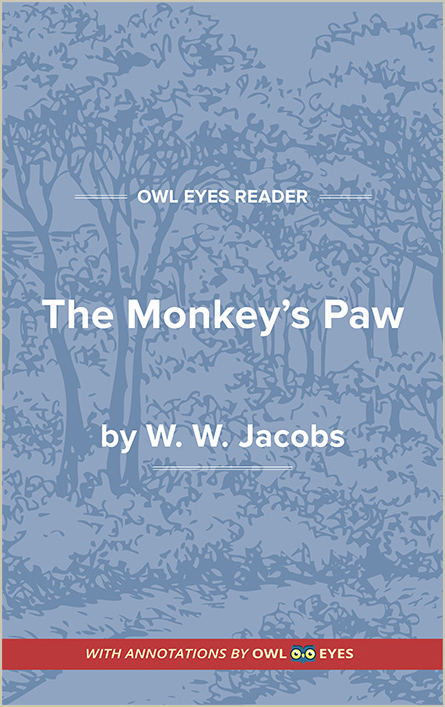Analysis Pages
Plot in The Monkey's Paw
Plot Examples in The Monkey's Paw:
I.
🔒""wish for something sensible."..." See in text (I.)
"just in time for him to catch the last train..." See in text (I.)
""Likely," said Herbert, with pretended horror. "Why, we're going to be rich, and famous and happy. Wish to be an emperor, father, to begin with; then you can't be henpecked."..." See in text (I.)
"a glass containing a little water to throw over it..." See in text (I.)
"Mrs. White said, "Tut, tut!" and coughed gently..." See in text (I.)
""He didn't want it, but I made him take it. And he pressed me again to throw it away."..." See in text (I.)
II.
🔒"and picked a piece of cotton from his trousers..." See in text (II.)
"brought a tailor's bill..." See in text (II.)
"laughed at his fears...." See in text (II.)
"In the brightness of the wintry sun next morning as it streamed over the breakfast table..." See in text (II.)
"His mother laughed, and following him to the door, watched him down the road..." See in text (II.)
""Herbert will have some more of his funny remarks, I expect, when he comes home," she said, as they sat at dinner..." See in text (II.)
"the other's averted face..." See in text (II.)
"as patiently as her sex would permit..." See in text (II.)
III.
🔒"The street lamp flickering opposite shone on a quiet and deserted road..." See in text (III.)
"The knocking ceased suddenly, although the echoes of it were still in the house..." See in text (III.)
"I wish my son alive again..." See in text (III.)
"He has been dead ten days..." See in text (III.)
"and striking one..." See in text (III.)
"He sat until he was chilled with the cold, glancing occasionally at the figure of the old woman peering through the window. The candle-end, which had burned below the rim of the china candlestick, was throwing pulsating shadows on the ceiling and walls, until, with a flicker larger than the rest, it expired..." See in text (III.)

